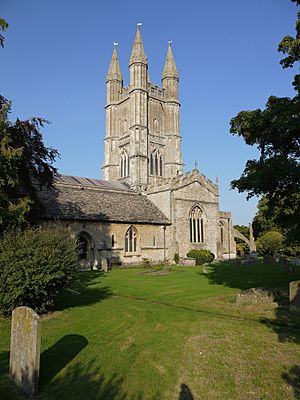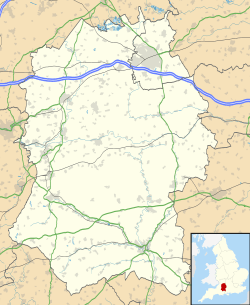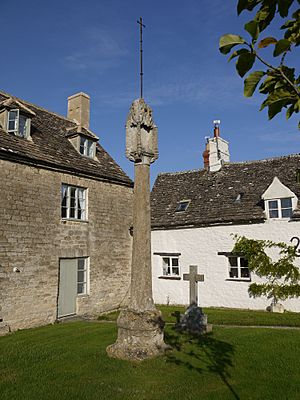St Sampson's Church, Cricklade facts for kids
Quick facts for kids St Sampson's, Cricklade |
|
|---|---|
| Church of St Sampson | |
 |
|
| 51°38′26″N 1°51′29″W / 51.6406°N 1.8580°W | |
| OS grid reference | SU09929354 |
| Location | Cricklade, Wiltshire |
| Country | England |
| Denomination | Anglican |
| History | |
| Status | Parish church |
| Architecture | |
| Functional status | Active |
| Years built | Late 12th century, restored 1863–4 |
| Administration | |
| Parish | Cricklade |
| Deanery | North Wiltshire |
| Archdeaconry | Malmesbury |
| Diocese | Bristol |
| Province | Canterbury |
St Sampson's is a very old and important Church of England parish church in the town of Cricklade, Wiltshire, England. It's a large church with aisles and a tall tower in the middle. The main building was constructed in the late 1100s. However, you can still find small parts of an even older Anglo-Saxon church within its walls. St Sampson's is a Grade I listed building, which means it's recognized as a historically significant place.
The church is named after Saint Samson of Dol. He was born in Wales in the late 400s. Saint Samson was one of the people who helped bring Christianity to Brittany.
Contents
History and Building of St Sampson's
A stone church was first mentioned on this spot around the year 973. The famous Domesday Book of 1086 also recorded the church. This book was a huge survey of England ordered by William the Conqueror.
Early Anglo-Saxon Features
You can still see small pieces of Anglo-Saxon stonework in the church today. These are mainly found in the south wall of the main part of the church, called the nave.
Medieval Changes and Additions
The north arcade, which is a row of arches, was added in the late 1100s. The south arcade was built in the 1200s when the church was updated. The chancel, the area around the altar, is from the 1200s. It was later changed in the 1300s and 1400s. To the north of the church is the Hungerford chapel. This chapel was likely built for Sir Edmund Hungerford, who passed away in 1484.
The Impressive Central Tower
The church's tower began construction in the early 1500s. It was finished in the 1550s. The Duke of Northumberland and the Hungerford family helped pay for it. A famous expert, Nikolaus Pevsner, described the tower as "proud and self-certain." Simon Jenkins, in his book England's Thousand Best Churches, called it "massive rather than graceful."
Victorian Restoration and Art
The church underwent a big restoration in 1863–1864. This work was led by an architect named Ewan Christian. The beautiful stained glass in the west window was made by Charles Eamer Kempe in 1888. Later, in 1930, Martin Travers designed two more windows. He also decorated the two altars in the church. St Sampson's was officially named a Grade I listed building in 1955.
Historic Crosses in the Churchyard
You can find two interesting old crosses in the churchyard.
Medieval Cross Shaft
Against the wall of a gatehouse at the northern edge of the churchyard, there's a broken part of a medieval limestone cross. It sits on a rough, eight-sided base. This piece shows how old the churchyard is.
The Town Cross
In the northeast part of the churchyard stands a 14th-century limestone cross. This cross is complete and has a carved top. It used to be the town cross. It stood at the High Street crossroads until around 1817-1820. That's when the old town hall was taken down. This cross is a Grade II* listed structure, meaning it's also very important historically.
St Sampson's Parish and Community
For many years, Cricklade had two separate church parishes: St Sampson's and St Mary's.
Uniting Parishes
In 1952, the two parishes of Cricklade were joined together. At the same time, St Sampson's became part of 'The United Benefice of Cricklade with Latton'. This group also included St John the Baptist at Latton. It also included the now-closed St Mary's at Eysey, which was demolished in 1953.
St Sampson's as the Main Church
In 1981, St Mary's church was no longer used for regular services. This made St Sampson's the only active church for the Cricklade parish. Since 2007, these parishes have been part of the Upper Thames Group. This group also includes Holy Cross at Ashton Keynes, All Saints at Leigh, and St John at Latton.



